人教版2023年中考英语一轮复习 第二课时 七年级上册(Unit 5~Unit 9)课件(共56张PPT)
文档属性
| 名称 | 人教版2023年中考英语一轮复习 第二课时 七年级上册(Unit 5~Unit 9)课件(共56张PPT) |
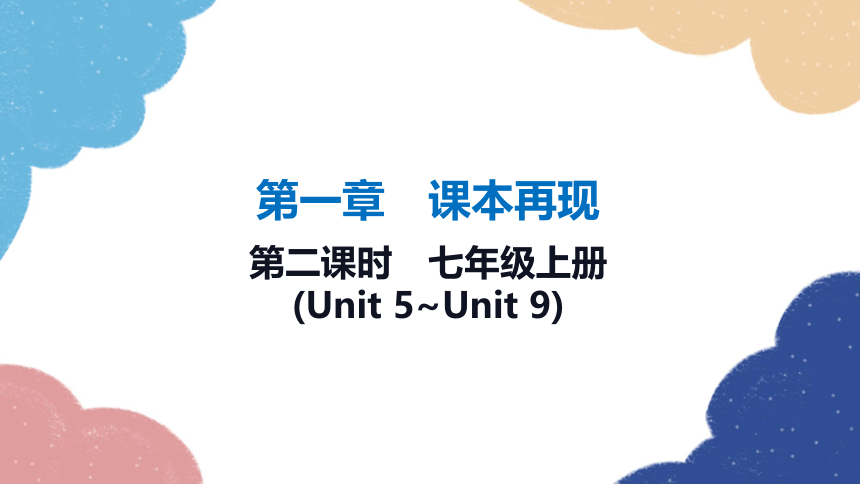
|
|
| 格式 | pptx | ||
| 文件大小 | 503.1KB | ||
| 资源类型 | 教案 | ||
| 版本资源 | 人教新目标(Go for it)版 | ||
| 科目 | 英语 | ||
| 更新时间 | 2023-05-23 00:00:00 | ||
图片预览

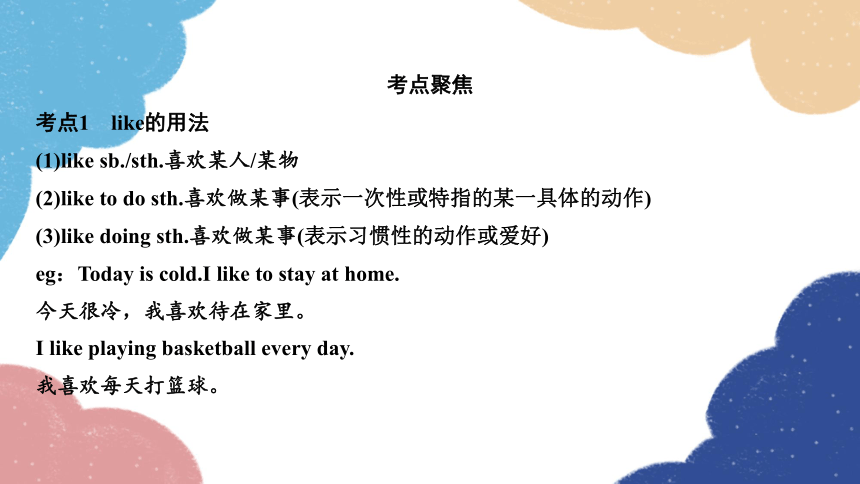
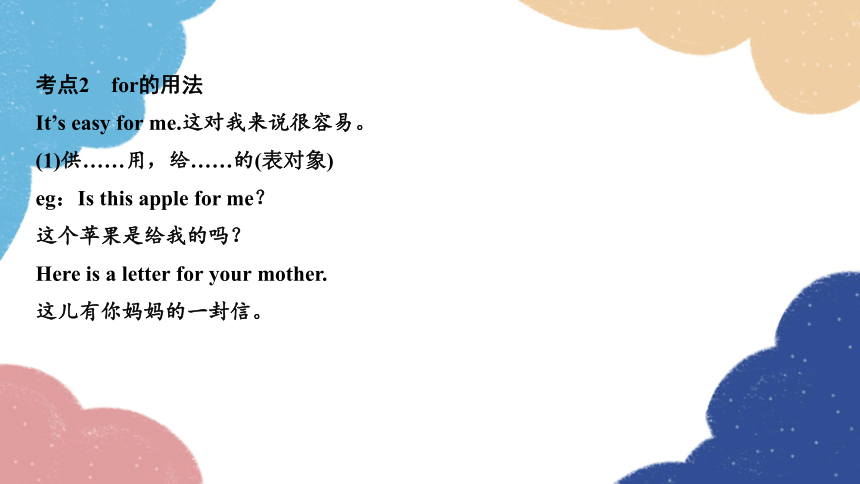
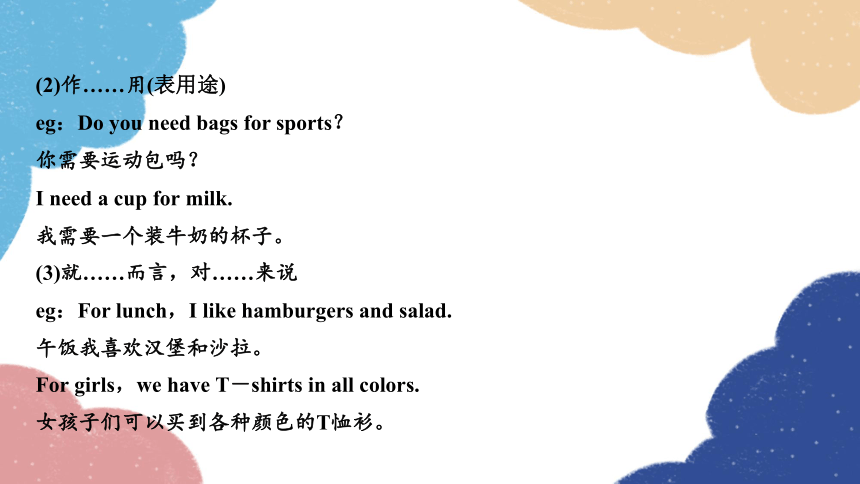
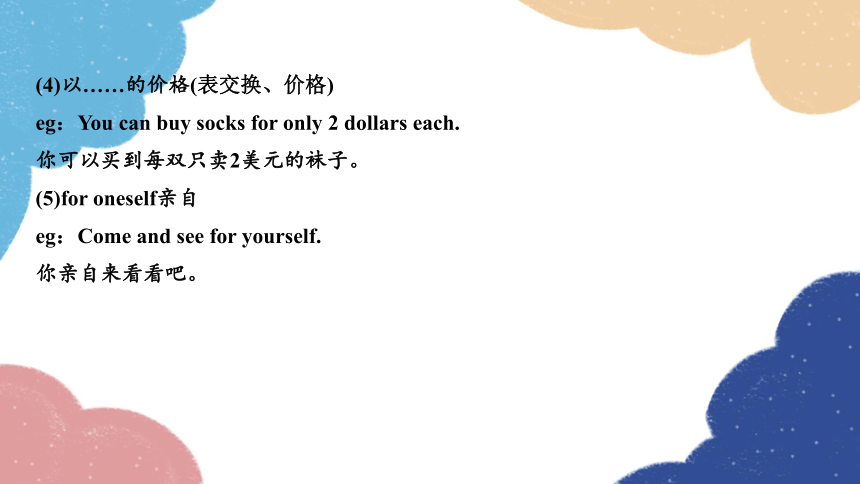

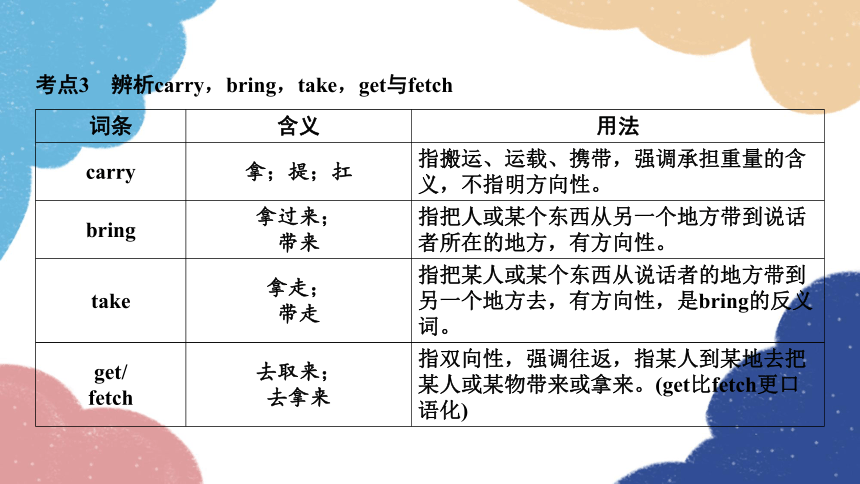
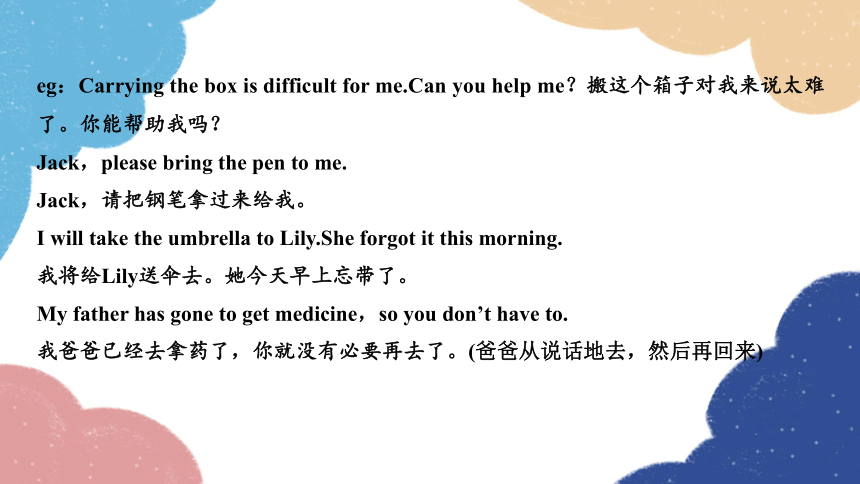
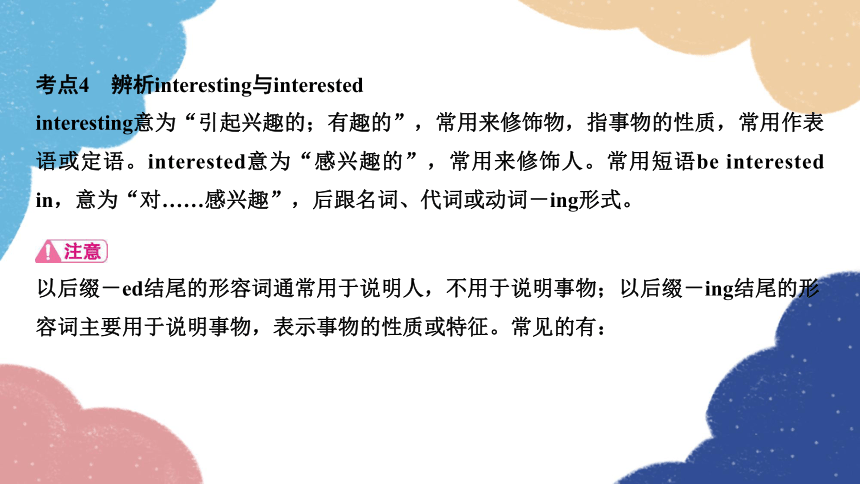
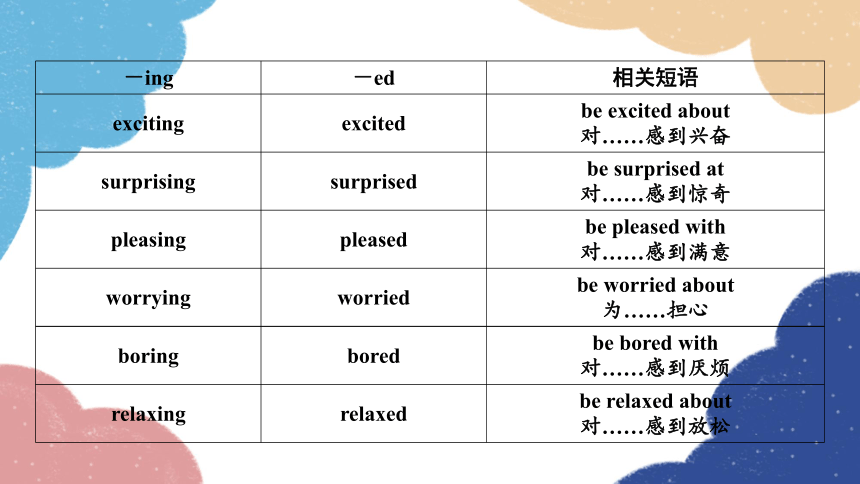
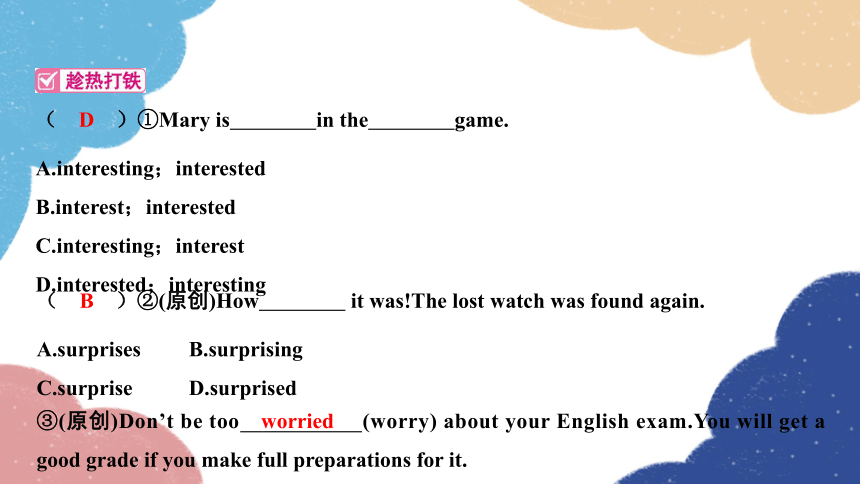
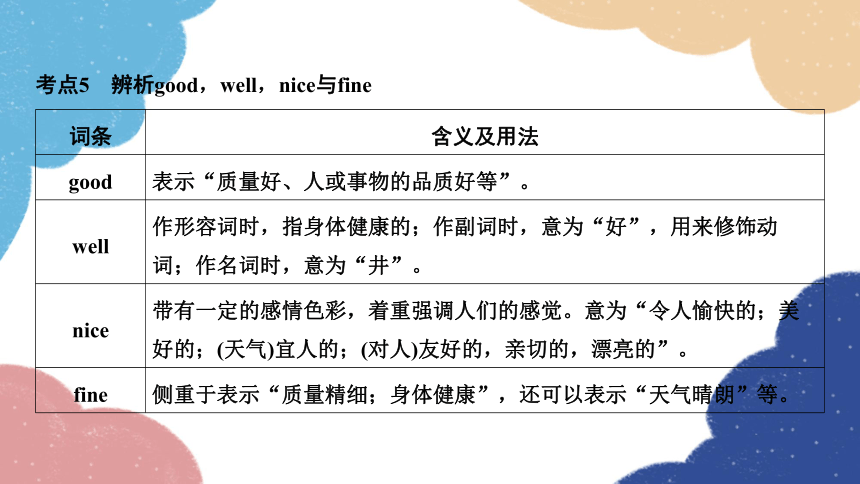
文档简介
(共56张PPT)
第二课时 七年级上册
(Unit 5~Unit 9)
第一章 课本再现
考点聚焦
考点1 like的用法
(1)like sb./sth.喜欢某人/某物
(2)like to do sth.喜欢做某事(表示一次性或特指的某一具体的动作)
(3)like doing sth.喜欢做某事(表示习惯性的动作或爱好)
eg:Today is cold.I like to stay at home.
今天很冷,我喜欢待在家里。
I like playing basketball every day.
我喜欢每天打篮球。
考点2 for的用法
It’s easy for me.这对我来说很容易。
(1)供……用,给……的(表对象)
eg:Is this apple for me?
这个苹果是给我的吗?
Here is a letter for your mother.
这儿有你妈妈的一封信。
(2)作……用(表用途)
eg:Do you need bags for sports?
你需要运动包吗?
I need a cup for milk.
我需要一个装牛奶的杯子。
(3)就……而言,对……来说
eg:For lunch,I like hamburgers and salad.
午饭我喜欢汉堡和沙拉。
For girls,we have T-shirts in all colors.
女孩子们可以买到各种颜色的T恤衫。
(4)以……的价格(表交换、价格)
eg:You can buy socks for only 2 dollars each.
你可以买到每双只卖2美元的袜子。
(5)for oneself亲自
eg:Come and see for yourself.
你亲自来看看吧。
( D )①—What did you get your birthday,Tony?
—A new bike,from my aunt.
A.to B.at C.with D.for
( A )②It is very important people to have food and water every day.
A.for B.of C.with D.about
D
A
考点3 辨析carry,bring,take,get与fetch
词条 含义 用法
carry 拿;提;扛 指搬运、运载、携带,强调承担重量的含义,不指明方向性。
bring 拿过来; 带来 指把人或某个东西从另一个地方带到说话者所在的地方,有方向性。
take 拿走; 带走 指把某人或某个东西从说话者的地方带到另一个地方去,有方向性,是bring的反义词。
get/ fetch 去取来; 去拿来 指双向性,强调往返,指某人到某地去把某人或某物带来或拿来。(get比fetch更口语化)
eg:Carrying the box is difficult for me.Can you help me?搬这个箱子对我来说太难了。你能帮助我吗?
Jack,please bring the pen to me.
Jack,请把钢笔拿过来给我。
I will take the umbrella to Lily.She forgot it this morning.
我将给Lily送伞去。她今天早上忘带了。
My father has gone to get medicine,so you don’t have to.
我爸爸已经去拿药了,你就没有必要再去了。(爸爸从说话地去,然后再回来)
考点4 辨析interesting与interested
interesting意为“引起兴趣的;有趣的”,常用来修饰物,指事物的性质,常用作表语或定语。interested意为“感兴趣的”,常用来修饰人。常用短语be interested in,意为“对……感兴趣”,后跟名词、代词或动词-ing形式。
以后缀-ed结尾的形容词通常用于说明人,不用于说明事物;以后缀-ing结尾的形容词主要用于说明事物,表示事物的性质或特征。常见的有:
-ing -ed 相关短语
exciting excited be excited about
对……感到兴奋
surprising surprised be surprised at
对……感到惊奇
pleasing pleased be pleased with
对……感到满意
worrying worried be worried about
为……担心
boring bored be bored with
对……感到厌烦
relaxing relaxed be relaxed about
对……感到放松
( D )①Mary is in the game.
A.interesting;interested
B.interest;interested
C.interesting;interest
D.interested;interesting
D
( B )②(原创)How it was!The lost watch was found again.
A.surprises B.surprising
C.surprise D.surprised
③(原创)Don’t be too worried (worry) about your English exam.You will get a good grade if you make full preparations for it.
B
worried
考点5 辨析good,well,nice与fine
词条 含义及用法
good 表示“质量好、人或事物的品质好等”。
well 作形容词时,指身体健康的;作副词时,意为“好”,用来修饰动词;作名词时,意为“井”。
nice 带有一定的感彩,着重强调人们的感觉。意为“令人愉快的;美好的;(天气)宜人的;(对人)友好的,亲切的,漂亮的”。
fine 侧重于表示“质量精细;身体健康”,还可以表示“天气晴朗”等。
He doesn’t feel well.
他感觉不舒服。
He learns English well.
他英语学得好。
I have a nice dress.
我有一件漂亮的连衣裙。
I’m fine,and you?
我很好,你呢?
eg:He is a good student.
他是一名好学生。
( A )①This kind of T-shirt looks and sells .
A.good;well B.nice;good
C.well;well D.good;nice
fine nice well
②(原创)I think the actors and actresses in the movie The Climbers do well .
③(原创)—How are you,Jason?
—I’m fine ,thank you.
④(原创)Betty’s coat looks nice ,isn’t it?
A
well
fine
nice
考点6 有关“许多”的表达
(1)lots of=a lot of,用于修饰可数名词复数或不可数名词。
eg:lots of/a lot of bananas许多香蕉
lots of/a lot of water许多水
(2)many用于修饰可数名词复数。
eg:many boys许多男孩
many lemons许多柠檬
(3)much用于修饰不可数名词。
eg:much water许多水
much broccoli许多西兰花
(4)询问数量的句型:
①How many+可数名词复数+其他?
eg:How many apples do you have?
你有多少个苹果?
②How much+不可数名词+其他?
eg:How much milk do you want?
你想要多少牛奶?
( C )How many do you want?
A.hamburger B.apple
C.bananas D.chicken
C
考点7 成双成对物品表示法
socks(短袜),shoes(鞋),pants(裤子),shorts(短裤)等都是成双成对的物品,一般以复数形式出现,作主语时谓语动词用复数形式。当它们和a pair of(一双/副/对)连用作主语时,谓语动词要与pair在数上保持一致。
①The pants are (be) Tom’s.
②The pair of pants is (be) Tom’s.
are
is
考点8 辨析buy,sell与sale
词条 用法
buy v.买 buy sb.sth.=buy sth.for sb.
为某人买某物
buy sth.from sb.
从某人那里买某物
sell v.卖 sell sb.sth.=sell sth.to sb.
把某物卖给某人
sell well畅销(主动形式表被动意义)
sell out卖光,售完
sell off甩卖;卖掉
sale n. 销售,出售 on sale 出售,上市;降价出售
for sale待售;供出售
在完成时态的句子中,后面接表示时间的for或since 短语时,常用have替换buy,因为buy为短暂性动词,不可与表示时间段的状语连用,而have为延续性动词,可与表示时间段的状语连用。
( A )①(2022·恩施州改编)Dear,new term is coming.I’ve bought a Chinese-English dictionary you.
A.for B.with C.to D.in
( C )②(2022·绥化)The specials in the restaurant taste and sell .Many customers come here on weekends.
A.well;good B.good;good
C.good;well
A
C
考点9 辨析时间介词on,in与at
词条 用法 示例
on 用在具体的某一天的某时间段、星期几或具体的日期等的前面。 on Monday morning
在星期一早上
on Saturday在星期六
on May 28th在5月28日
in 用在泛指的上午、下午或晚上前,也可用于月份、季节或年份等的前面。 in the afternoon在下午
in April在4月
in spring在春天
in 2020在2020年
词条 用法 示例
at 用在钟点、用餐时间、节日、年龄、一天中的某段时间等的前面。 at 7:00在7点
at dinner time
在晚餐时间
at night在晚上
( A )①(2020·重庆A卷改编)More villagers will move to new houses 2025.
A.in B.on C.at D.for
( B )②—When did the terrible earthquake happen in Ya’an,Sichuan?
—It happened 8:02 the morning of April 20th,2013.
A.on;in B.at;on
C.at;in D.on;on
A
B
考点10 辨析look,see,watch与read
(1)look指看的动作,不一定看见,其后接宾语时需加at;作系动词时,后可接形容词作表语。
eg:He looks at the blackboard,but can’t see the words.他看了看黑板,但看不见这些单词。
(2)see后面直接接宾语,强调看的结果。
eg:see the doctor看医生
see a film/movie看电影
(3)watch指非常仔细、全神贯注地看,常表示看某活动的画面。
eg:watch TV看电视
watch the football game看足球比赛
(4)read意为“读,朗读”。
eg:read a book读书
考点11 辨析join,join in,attend与take part in
词条 用法
join 参加某个组织、团体,成为其中一员,如参军、入党等。
join in 参加某一具体活动,常用于join sb.in (doing) sth.结构。
attend 正式用语,意为“出席”,指参加会议、婚礼、葬礼、典礼等。
take part in 参加会议、群众性活动或比赛项目,并起一定作用。
eg:He joined the army.他参军了。
Will you join us in playing basketball?
你要跟我们一起打篮球吗?
Marsha and Susie left for Shanghai to attend an international meeting last weekend.Marsha和Susie上个周末前往上海参加了一场国际会议。
The teacher took part in our discussion yesterday.昨天老师参与了我们的讨论。
考点12 辨析tell,speak,say与talk
词条 用法
tell (强调告诉,讲述) 可接双宾语(tell sb.sth.),双宾语易位时用to引出间接宾语(tell sth.to sb.),还可接不定式的复合结构作宾语(tell sb.to do sth.)。
speak (强调说某种语言) 可直接加语言,意为“说某种语言”。表示“对/和某人说(某事)”可用speak to/with sb.
about sth.。
say (强调说话内容) 表示“对某人说某事”可用say sth.to sb.。
talk (强调双方交谈) 表示“同某人谈论(某事)”可用talk to/with sb.about sth.。
eg:I want to tell you the good news.
我想告诉你这个好消息。
He can speak English.他会说英语。
Do you want to say anything to me?
你想跟我说点儿什么吗?
Lucy wants to talk with me.
Lucy想跟我谈一谈。
( C )(2020·济南)Don’t forget to “Thank you”when someone has helped you.
A.speak B.tell
C.say D.talk
C
考点13 辨析hear,listen to与sound
(1)hear意为“听见,听到”,强调听的结果。常见的短语:
①hear sb.do sth.听见某人做某事(全过程)
②hear sb.doing sth.听到某人正在做某事
eg:I called you,but you didn’t hear.
我叫你了,但你没有听到。
③hear from sb.=receive a letter from sb.
收到某人的来信
④hear of=hear about 听说
(2)listen to意为“听……”,强调听的动作,不一定听见。
eg:Please listen to me.请听我说。
(3)sound意为“听起来”,常接形容词作表语。
eg:Tom had a fight with his best friend.He sounds angry.Tom和他的好朋友吵了一架,他听起来非常生气。
( D )I often hear the blind girl in the old house.
A.singing B.sings C.to sing D.sing
D
考点14 be good with sb.的用法
(1)be good with sb.=get on well with sb.,意为“与某人相处得好”。
(2)good的其他短语:
be good to sb.对某人好
be good for...对……有益
be good at...擅长……
eg:My teacher is good to me.
老师对我很好。
Learning English well is good for us.
学好英语对我们有好处。
Lucy is good at English.Lucy擅长英语。
( C )—Are you the children?
—Yes,I am.
A.good at B.good for
C.good with D.good in
C
重点语法
语法点一 一般现在时
(1)用法
①表示现在的状态。
eg:She is at home.她在家。
②表示经常性或习惯性的动作。
eg:I go to school at 7:30 every day.
我每天七点半去上学。
③表示客观事实、普遍真理或自然现象。
eg:No news is good news.
没有消息就是好消息。
The earth is round.地球是圆的。
(2)在一般现在时的句子中,句子的谓语动词若是实义动词,常借助助动词do或does来构成否定句或疑问句。does用于主语是第三人称单数的句子中,其他情况用do。
(3)do和does
①作助动词,帮助构成一般现在时的否定句或疑问句,无意义。
eg:Do you have a soccer ball?你有足球吗?
I don’t know.我不知道。
What does he like?他喜欢什么?
He doesn’t like English.他不喜欢英语。
②作实义动词,表示“做,干,行动”。
eg:I do my homework every day.
我每天都做家庭作业。
Bob does housework every day.
Bob每天都做家务。
③在一般现在时中,do/does可用来替代上文出现的动词,以避免重复。
eg:I don’t have a soccer ball,but my brother Alan does.我没有足球,但我的哥哥Alan有。
④肯定式和否定式
肯定式和否定式
人称 第一人称 第二人称 第三人称
单数 I like... I do not(don’t) like... You like... You do not (don’t) like... He/She/It
likes...
He/She/It
does not
(doesn’t)
like...
复数 We like... We do not (don’t) like... You like... You do not (don’t) like... They like...
They do not
(don’t)like...
⑤疑问式和简略答语
疑问式和简略答语
人称 第一人称 第二人称 第三人称
单数 —Do I like oranges? —Yes,you do./No,you don’t. —Do you like oranges? —Yes,I do./ No,I don’t. —Does he/she
like oranges?
—Yes,he/she
does./No,he/she doesn’t.
复数 —Do we like oranges? —Yes,we do./No,we don’t. —Do you like oranges? —Yes,we do./No,we don’t. —Do they like oranges?
—Yes,they
do./No,they
don’t.
(4)当主语是第三人称单数时,谓语动词形式有以下几种变化:
规则 动词原形 第三人称单数形式
一般动词在词尾加-s,在清辅音后读/s/,在浊辅音和元音后读/z/,在t后读/ts/,在d后读/dz/。 help swim listen know play get find helps
swims
listens
knows
plays
gets
finds
以字母s,x,sh,ch结尾的动词加-es,读/ z/。如果动词词尾已有e,则加-s。以o结尾的动词也加-es,读/z/。 teach like go teaches
likes
goes
以辅音字母加y结尾的动词,先变y为i,再加-es,读/z/。 study studies
( A )①Grace this game every time we play.
A.wins B.won
C.will win D.has won
( D )②If we take environmental problems seriously,the earth worse and worse.
A.don’t;won’t be B.won’t;isn’t
C.won’t;is D.don’t;willbe
A
D
语法点二 数词
(1)基数词变序数词
口诀记忆
基数词变序数词口诀
基变序,有规律,词尾加上-th(fourth,sixth)。一、二、三,特殊记,结尾字母t,d,d(first,second,third)。八去t,九去e(eighth,ninth),ve要用f替(fifth,twelfth)。ty将y改成i,th前面有个e。若是碰到几十几,只变个位就可以。
(2)分数表达法
分数由分子和分母组成。分子用基数词表示,分母用序数词表示。分子是1时,分母(序数词)用单数形式;分子大于1时,分母用复数形式,即序数词加-s。当分数前面还有整数时,要用连词and连接。
eg:one sixth六分之一 two thirds三分之二
five and two thirds五又三分之二
口诀记忆
英语分数巧记
英语分数不费事,“母序子基”四个字。
分子若是大于1,分母还须加-s。
( C )①(2018·咸宁改编)—Nowadays China has about40,000 kilometers of high-speed railways.
—That’s of the world’s total.
A.two third B.two-third
C.two thirds D.two three
( B )②(2020·天水)My grandparents live in an old apartment with floors and they are on the floor.
A.five;five B.five;fifth
C.fifth;fifth D.fifth;five
C
B
备考演练
一、单项选择
( C )1.(2022·遂宁)There is useful robot in the restaurant near my home.It can serve food to customers.
A.an B.the C.a D./
( C )2.I love sweets but Mom doesn’t let me them very often.
A.to have B.having C.have D.has
C
C
( D )3.(2022·甘肃)—Happy birthday to you,Mary.
— .
A.Have a nice day B.See you
C.The same to you D.Thank you
( D )4.There lots of people in the restaurant at lunchtime on Mondays.
A.is B.was C.were D.are
( B )5.(2020·重庆B卷)Teachers’ Day is in September,the month of the year.
A.nine B.ninth C.ten D.tenth
D
D
B
( B )6.— your son have a key?
—No,he .
A.Do;don’t B.Does;doesn’t
C.Do;doesn’t D.Does;don’t
( A )7.(2022·北京)We have history class three o’clock every Friday afternoon.
A.at B.on C.in D.to
( D )8.He has some and I have some .
A.egg;salad B.tomatoes;pear
C.ice-cream;apple D.pears;milk
B
A
D
( C )9.—What about soccer after school?
—Sounds great!
A.play B.plays
C.playing D.to play
( B )10.Here some socks.We sell them very good prices.
A.are;for B.are;at
C.is;at D.is;for
C
B
二、用所给词的适当形式填空
1.We have a Chinese (China) lesson every day.
2.Today is Jenny’s twentieth (twenty) birthday.
3.Three years is (be) really a short time for me.
4.She doesn’t do (not do) housework from Monday to Friday.
5.Bob is a friend of hers (she).
6.Jack with his grandfather often has fun playing (play) with their little dog.
7.The book is interesting .Jim is interested in it.(interest)
8.After school,Helen always finishes (finish) her homework first.
9.I don’t want to be (be) fat.
10.Her sister’s (sister) birthday is on November 3rd.
Chinese
twentieth
is
doesn’t do
hers
playing
interesting
interested
finishes
to be
sister’s
感受中考
一、单项选择
( C )1.(2020·天水)We have time that we can finish the work very well.
A.such much B.so many
C.so much D.such many
( B )2.(2021·武威)—What’s twenty and fifty?
—It’s .
A.fifty B.seventy
C.eighty D.ninety
C
B
( A )3.(2022·重庆B卷)Father’s Day comes June every year.
A.in B.on C.at D.to
( A )4.(2020·鄂州)Because of the special situation this year,about of the students having classes on the Internet at home.
A.two thirds;are B.two third;is
C.second thirds;are D.two thirds;is
A
A
( C )5.(2022·朝阳)—It is Mom’s birthday next Wednesday.What should we do?
—What about buying her flowers to show our love?
A.forty;forty B.forty;fortieth
C.fortieth;forty D.fortieth;fortieth
C
二、完形填空(2022·甘南州改编)
Stephy worked 1 a salesperson(售货员) in a big shopping mall.Chinese Double Seventh Festival was coming soon so she was very 2 these days.A lot of people came here to buy 3 .Some new clothes would arrive tomorrow,so she needed to take the old clothes from the shelves, 4 there was no enough space.The clothes were 5 .
In the afternoon,when she was busy 6 the clothes tidy,an old man came to her.He looked 7 .She remembered that he bought a red skirt from her half an hour ago.He asked her if she saw a black wallet.At that moment,Stephy had no time to 8 the wallet for him,so she just asked him to go to the lost and found desk.He thanked her and left.
After a while she found the wallet in the 9 clothes.She ran to the old man at once and gave the wallet back to him.He smiled and thanked her for many times.He said there was the only photo of his wife in it and his wife had passed away for ten years.Stephy gave him a hug 10 tears in her eyes.
( A )1.A.as B.of C.for
( B )2.A.angry B.busy C.sad
( B )3.A.food B.gifts C.books
( C )4.A.unless B.if C.because
( B )5.A.anywhere B.everywhere C.somewhere
( C )6.A.make B.made C.making
( B )7.A.scared B.upset C.happy
( A )8.A.look for B.look at C.look up
( B )9.A.tidy B.messy C.dirty
( A )10.A.with B.without C.has
A
B
B
C
B
C
B
A
B
A
第二课时 七年级上册
(Unit 5~Unit 9)
第一章 课本再现
考点聚焦
考点1 like的用法
(1)like sb./sth.喜欢某人/某物
(2)like to do sth.喜欢做某事(表示一次性或特指的某一具体的动作)
(3)like doing sth.喜欢做某事(表示习惯性的动作或爱好)
eg:Today is cold.I like to stay at home.
今天很冷,我喜欢待在家里。
I like playing basketball every day.
我喜欢每天打篮球。
考点2 for的用法
It’s easy for me.这对我来说很容易。
(1)供……用,给……的(表对象)
eg:Is this apple for me?
这个苹果是给我的吗?
Here is a letter for your mother.
这儿有你妈妈的一封信。
(2)作……用(表用途)
eg:Do you need bags for sports?
你需要运动包吗?
I need a cup for milk.
我需要一个装牛奶的杯子。
(3)就……而言,对……来说
eg:For lunch,I like hamburgers and salad.
午饭我喜欢汉堡和沙拉。
For girls,we have T-shirts in all colors.
女孩子们可以买到各种颜色的T恤衫。
(4)以……的价格(表交换、价格)
eg:You can buy socks for only 2 dollars each.
你可以买到每双只卖2美元的袜子。
(5)for oneself亲自
eg:Come and see for yourself.
你亲自来看看吧。
( D )①—What did you get your birthday,Tony?
—A new bike,from my aunt.
A.to B.at C.with D.for
( A )②It is very important people to have food and water every day.
A.for B.of C.with D.about
D
A
考点3 辨析carry,bring,take,get与fetch
词条 含义 用法
carry 拿;提;扛 指搬运、运载、携带,强调承担重量的含义,不指明方向性。
bring 拿过来; 带来 指把人或某个东西从另一个地方带到说话者所在的地方,有方向性。
take 拿走; 带走 指把某人或某个东西从说话者的地方带到另一个地方去,有方向性,是bring的反义词。
get/ fetch 去取来; 去拿来 指双向性,强调往返,指某人到某地去把某人或某物带来或拿来。(get比fetch更口语化)
eg:Carrying the box is difficult for me.Can you help me?搬这个箱子对我来说太难了。你能帮助我吗?
Jack,please bring the pen to me.
Jack,请把钢笔拿过来给我。
I will take the umbrella to Lily.She forgot it this morning.
我将给Lily送伞去。她今天早上忘带了。
My father has gone to get medicine,so you don’t have to.
我爸爸已经去拿药了,你就没有必要再去了。(爸爸从说话地去,然后再回来)
考点4 辨析interesting与interested
interesting意为“引起兴趣的;有趣的”,常用来修饰物,指事物的性质,常用作表语或定语。interested意为“感兴趣的”,常用来修饰人。常用短语be interested in,意为“对……感兴趣”,后跟名词、代词或动词-ing形式。
以后缀-ed结尾的形容词通常用于说明人,不用于说明事物;以后缀-ing结尾的形容词主要用于说明事物,表示事物的性质或特征。常见的有:
-ing -ed 相关短语
exciting excited be excited about
对……感到兴奋
surprising surprised be surprised at
对……感到惊奇
pleasing pleased be pleased with
对……感到满意
worrying worried be worried about
为……担心
boring bored be bored with
对……感到厌烦
relaxing relaxed be relaxed about
对……感到放松
( D )①Mary is in the game.
A.interesting;interested
B.interest;interested
C.interesting;interest
D.interested;interesting
D
( B )②(原创)How it was!The lost watch was found again.
A.surprises B.surprising
C.surprise D.surprised
③(原创)Don’t be too worried (worry) about your English exam.You will get a good grade if you make full preparations for it.
B
worried
考点5 辨析good,well,nice与fine
词条 含义及用法
good 表示“质量好、人或事物的品质好等”。
well 作形容词时,指身体健康的;作副词时,意为“好”,用来修饰动词;作名词时,意为“井”。
nice 带有一定的感彩,着重强调人们的感觉。意为“令人愉快的;美好的;(天气)宜人的;(对人)友好的,亲切的,漂亮的”。
fine 侧重于表示“质量精细;身体健康”,还可以表示“天气晴朗”等。
He doesn’t feel well.
他感觉不舒服。
He learns English well.
他英语学得好。
I have a nice dress.
我有一件漂亮的连衣裙。
I’m fine,and you?
我很好,你呢?
eg:He is a good student.
他是一名好学生。
( A )①This kind of T-shirt looks and sells .
A.good;well B.nice;good
C.well;well D.good;nice
fine nice well
②(原创)I think the actors and actresses in the movie The Climbers do well .
③(原创)—How are you,Jason?
—I’m fine ,thank you.
④(原创)Betty’s coat looks nice ,isn’t it?
A
well
fine
nice
考点6 有关“许多”的表达
(1)lots of=a lot of,用于修饰可数名词复数或不可数名词。
eg:lots of/a lot of bananas许多香蕉
lots of/a lot of water许多水
(2)many用于修饰可数名词复数。
eg:many boys许多男孩
many lemons许多柠檬
(3)much用于修饰不可数名词。
eg:much water许多水
much broccoli许多西兰花
(4)询问数量的句型:
①How many+可数名词复数+其他?
eg:How many apples do you have?
你有多少个苹果?
②How much+不可数名词+其他?
eg:How much milk do you want?
你想要多少牛奶?
( C )How many do you want?
A.hamburger B.apple
C.bananas D.chicken
C
考点7 成双成对物品表示法
socks(短袜),shoes(鞋),pants(裤子),shorts(短裤)等都是成双成对的物品,一般以复数形式出现,作主语时谓语动词用复数形式。当它们和a pair of(一双/副/对)连用作主语时,谓语动词要与pair在数上保持一致。
①The pants are (be) Tom’s.
②The pair of pants is (be) Tom’s.
are
is
考点8 辨析buy,sell与sale
词条 用法
buy v.买 buy sb.sth.=buy sth.for sb.
为某人买某物
buy sth.from sb.
从某人那里买某物
sell v.卖 sell sb.sth.=sell sth.to sb.
把某物卖给某人
sell well畅销(主动形式表被动意义)
sell out卖光,售完
sell off甩卖;卖掉
sale n. 销售,出售 on sale 出售,上市;降价出售
for sale待售;供出售
在完成时态的句子中,后面接表示时间的for或since 短语时,常用have替换buy,因为buy为短暂性动词,不可与表示时间段的状语连用,而have为延续性动词,可与表示时间段的状语连用。
( A )①(2022·恩施州改编)Dear,new term is coming.I’ve bought a Chinese-English dictionary you.
A.for B.with C.to D.in
( C )②(2022·绥化)The specials in the restaurant taste and sell .Many customers come here on weekends.
A.well;good B.good;good
C.good;well
A
C
考点9 辨析时间介词on,in与at
词条 用法 示例
on 用在具体的某一天的某时间段、星期几或具体的日期等的前面。 on Monday morning
在星期一早上
on Saturday在星期六
on May 28th在5月28日
in 用在泛指的上午、下午或晚上前,也可用于月份、季节或年份等的前面。 in the afternoon在下午
in April在4月
in spring在春天
in 2020在2020年
词条 用法 示例
at 用在钟点、用餐时间、节日、年龄、一天中的某段时间等的前面。 at 7:00在7点
at dinner time
在晚餐时间
at night在晚上
( A )①(2020·重庆A卷改编)More villagers will move to new houses 2025.
A.in B.on C.at D.for
( B )②—When did the terrible earthquake happen in Ya’an,Sichuan?
—It happened 8:02 the morning of April 20th,2013.
A.on;in B.at;on
C.at;in D.on;on
A
B
考点10 辨析look,see,watch与read
(1)look指看的动作,不一定看见,其后接宾语时需加at;作系动词时,后可接形容词作表语。
eg:He looks at the blackboard,but can’t see the words.他看了看黑板,但看不见这些单词。
(2)see后面直接接宾语,强调看的结果。
eg:see the doctor看医生
see a film/movie看电影
(3)watch指非常仔细、全神贯注地看,常表示看某活动的画面。
eg:watch TV看电视
watch the football game看足球比赛
(4)read意为“读,朗读”。
eg:read a book读书
考点11 辨析join,join in,attend与take part in
词条 用法
join 参加某个组织、团体,成为其中一员,如参军、入党等。
join in 参加某一具体活动,常用于join sb.in (doing) sth.结构。
attend 正式用语,意为“出席”,指参加会议、婚礼、葬礼、典礼等。
take part in 参加会议、群众性活动或比赛项目,并起一定作用。
eg:He joined the army.他参军了。
Will you join us in playing basketball?
你要跟我们一起打篮球吗?
Marsha and Susie left for Shanghai to attend an international meeting last weekend.Marsha和Susie上个周末前往上海参加了一场国际会议。
The teacher took part in our discussion yesterday.昨天老师参与了我们的讨论。
考点12 辨析tell,speak,say与talk
词条 用法
tell (强调告诉,讲述) 可接双宾语(tell sb.sth.),双宾语易位时用to引出间接宾语(tell sth.to sb.),还可接不定式的复合结构作宾语(tell sb.to do sth.)。
speak (强调说某种语言) 可直接加语言,意为“说某种语言”。表示“对/和某人说(某事)”可用speak to/with sb.
about sth.。
say (强调说话内容) 表示“对某人说某事”可用say sth.to sb.。
talk (强调双方交谈) 表示“同某人谈论(某事)”可用talk to/with sb.about sth.。
eg:I want to tell you the good news.
我想告诉你这个好消息。
He can speak English.他会说英语。
Do you want to say anything to me?
你想跟我说点儿什么吗?
Lucy wants to talk with me.
Lucy想跟我谈一谈。
( C )(2020·济南)Don’t forget to “Thank you”when someone has helped you.
A.speak B.tell
C.say D.talk
C
考点13 辨析hear,listen to与sound
(1)hear意为“听见,听到”,强调听的结果。常见的短语:
①hear sb.do sth.听见某人做某事(全过程)
②hear sb.doing sth.听到某人正在做某事
eg:I called you,but you didn’t hear.
我叫你了,但你没有听到。
③hear from sb.=receive a letter from sb.
收到某人的来信
④hear of=hear about 听说
(2)listen to意为“听……”,强调听的动作,不一定听见。
eg:Please listen to me.请听我说。
(3)sound意为“听起来”,常接形容词作表语。
eg:Tom had a fight with his best friend.He sounds angry.Tom和他的好朋友吵了一架,他听起来非常生气。
( D )I often hear the blind girl in the old house.
A.singing B.sings C.to sing D.sing
D
考点14 be good with sb.的用法
(1)be good with sb.=get on well with sb.,意为“与某人相处得好”。
(2)good的其他短语:
be good to sb.对某人好
be good for...对……有益
be good at...擅长……
eg:My teacher is good to me.
老师对我很好。
Learning English well is good for us.
学好英语对我们有好处。
Lucy is good at English.Lucy擅长英语。
( C )—Are you the children?
—Yes,I am.
A.good at B.good for
C.good with D.good in
C
重点语法
语法点一 一般现在时
(1)用法
①表示现在的状态。
eg:She is at home.她在家。
②表示经常性或习惯性的动作。
eg:I go to school at 7:30 every day.
我每天七点半去上学。
③表示客观事实、普遍真理或自然现象。
eg:No news is good news.
没有消息就是好消息。
The earth is round.地球是圆的。
(2)在一般现在时的句子中,句子的谓语动词若是实义动词,常借助助动词do或does来构成否定句或疑问句。does用于主语是第三人称单数的句子中,其他情况用do。
(3)do和does
①作助动词,帮助构成一般现在时的否定句或疑问句,无意义。
eg:Do you have a soccer ball?你有足球吗?
I don’t know.我不知道。
What does he like?他喜欢什么?
He doesn’t like English.他不喜欢英语。
②作实义动词,表示“做,干,行动”。
eg:I do my homework every day.
我每天都做家庭作业。
Bob does housework every day.
Bob每天都做家务。
③在一般现在时中,do/does可用来替代上文出现的动词,以避免重复。
eg:I don’t have a soccer ball,but my brother Alan does.我没有足球,但我的哥哥Alan有。
④肯定式和否定式
肯定式和否定式
人称 第一人称 第二人称 第三人称
单数 I like... I do not(don’t) like... You like... You do not (don’t) like... He/She/It
likes...
He/She/It
does not
(doesn’t)
like...
复数 We like... We do not (don’t) like... You like... You do not (don’t) like... They like...
They do not
(don’t)like...
⑤疑问式和简略答语
疑问式和简略答语
人称 第一人称 第二人称 第三人称
单数 —Do I like oranges? —Yes,you do./No,you don’t. —Do you like oranges? —Yes,I do./ No,I don’t. —Does he/she
like oranges?
—Yes,he/she
does./No,he/she doesn’t.
复数 —Do we like oranges? —Yes,we do./No,we don’t. —Do you like oranges? —Yes,we do./No,we don’t. —Do they like oranges?
—Yes,they
do./No,they
don’t.
(4)当主语是第三人称单数时,谓语动词形式有以下几种变化:
规则 动词原形 第三人称单数形式
一般动词在词尾加-s,在清辅音后读/s/,在浊辅音和元音后读/z/,在t后读/ts/,在d后读/dz/。 help swim listen know play get find helps
swims
listens
knows
plays
gets
finds
以字母s,x,sh,ch结尾的动词加-es,读/ z/。如果动词词尾已有e,则加-s。以o结尾的动词也加-es,读/z/。 teach like go teaches
likes
goes
以辅音字母加y结尾的动词,先变y为i,再加-es,读/z/。 study studies
( A )①Grace this game every time we play.
A.wins B.won
C.will win D.has won
( D )②If we take environmental problems seriously,the earth worse and worse.
A.don’t;won’t be B.won’t;isn’t
C.won’t;is D.don’t;willbe
A
D
语法点二 数词
(1)基数词变序数词
口诀记忆
基数词变序数词口诀
基变序,有规律,词尾加上-th(fourth,sixth)。一、二、三,特殊记,结尾字母t,d,d(first,second,third)。八去t,九去e(eighth,ninth),ve要用f替(fifth,twelfth)。ty将y改成i,th前面有个e。若是碰到几十几,只变个位就可以。
(2)分数表达法
分数由分子和分母组成。分子用基数词表示,分母用序数词表示。分子是1时,分母(序数词)用单数形式;分子大于1时,分母用复数形式,即序数词加-s。当分数前面还有整数时,要用连词and连接。
eg:one sixth六分之一 two thirds三分之二
five and two thirds五又三分之二
口诀记忆
英语分数巧记
英语分数不费事,“母序子基”四个字。
分子若是大于1,分母还须加-s。
( C )①(2018·咸宁改编)—Nowadays China has about40,000 kilometers of high-speed railways.
—That’s of the world’s total.
A.two third B.two-third
C.two thirds D.two three
( B )②(2020·天水)My grandparents live in an old apartment with floors and they are on the floor.
A.five;five B.five;fifth
C.fifth;fifth D.fifth;five
C
B
备考演练
一、单项选择
( C )1.(2022·遂宁)There is useful robot in the restaurant near my home.It can serve food to customers.
A.an B.the C.a D./
( C )2.I love sweets but Mom doesn’t let me them very often.
A.to have B.having C.have D.has
C
C
( D )3.(2022·甘肃)—Happy birthday to you,Mary.
— .
A.Have a nice day B.See you
C.The same to you D.Thank you
( D )4.There lots of people in the restaurant at lunchtime on Mondays.
A.is B.was C.were D.are
( B )5.(2020·重庆B卷)Teachers’ Day is in September,the month of the year.
A.nine B.ninth C.ten D.tenth
D
D
B
( B )6.— your son have a key?
—No,he .
A.Do;don’t B.Does;doesn’t
C.Do;doesn’t D.Does;don’t
( A )7.(2022·北京)We have history class three o’clock every Friday afternoon.
A.at B.on C.in D.to
( D )8.He has some and I have some .
A.egg;salad B.tomatoes;pear
C.ice-cream;apple D.pears;milk
B
A
D
( C )9.—What about soccer after school?
—Sounds great!
A.play B.plays
C.playing D.to play
( B )10.Here some socks.We sell them very good prices.
A.are;for B.are;at
C.is;at D.is;for
C
B
二、用所给词的适当形式填空
1.We have a Chinese (China) lesson every day.
2.Today is Jenny’s twentieth (twenty) birthday.
3.Three years is (be) really a short time for me.
4.She doesn’t do (not do) housework from Monday to Friday.
5.Bob is a friend of hers (she).
6.Jack with his grandfather often has fun playing (play) with their little dog.
7.The book is interesting .Jim is interested in it.(interest)
8.After school,Helen always finishes (finish) her homework first.
9.I don’t want to be (be) fat.
10.Her sister’s (sister) birthday is on November 3rd.
Chinese
twentieth
is
doesn’t do
hers
playing
interesting
interested
finishes
to be
sister’s
感受中考
一、单项选择
( C )1.(2020·天水)We have time that we can finish the work very well.
A.such much B.so many
C.so much D.such many
( B )2.(2021·武威)—What’s twenty and fifty?
—It’s .
A.fifty B.seventy
C.eighty D.ninety
C
B
( A )3.(2022·重庆B卷)Father’s Day comes June every year.
A.in B.on C.at D.to
( A )4.(2020·鄂州)Because of the special situation this year,about of the students having classes on the Internet at home.
A.two thirds;are B.two third;is
C.second thirds;are D.two thirds;is
A
A
( C )5.(2022·朝阳)—It is Mom’s birthday next Wednesday.What should we do?
—What about buying her flowers to show our love?
A.forty;forty B.forty;fortieth
C.fortieth;forty D.fortieth;fortieth
C
二、完形填空(2022·甘南州改编)
Stephy worked 1 a salesperson(售货员) in a big shopping mall.Chinese Double Seventh Festival was coming soon so she was very 2 these days.A lot of people came here to buy 3 .Some new clothes would arrive tomorrow,so she needed to take the old clothes from the shelves, 4 there was no enough space.The clothes were 5 .
In the afternoon,when she was busy 6 the clothes tidy,an old man came to her.He looked 7 .She remembered that he bought a red skirt from her half an hour ago.He asked her if she saw a black wallet.At that moment,Stephy had no time to 8 the wallet for him,so she just asked him to go to the lost and found desk.He thanked her and left.
After a while she found the wallet in the 9 clothes.She ran to the old man at once and gave the wallet back to him.He smiled and thanked her for many times.He said there was the only photo of his wife in it and his wife had passed away for ten years.Stephy gave him a hug 10 tears in her eyes.
( A )1.A.as B.of C.for
( B )2.A.angry B.busy C.sad
( B )3.A.food B.gifts C.books
( C )4.A.unless B.if C.because
( B )5.A.anywhere B.everywhere C.somewhere
( C )6.A.make B.made C.making
( B )7.A.scared B.upset C.happy
( A )8.A.look for B.look at C.look up
( B )9.A.tidy B.messy C.dirty
( A )10.A.with B.without C.has
A
B
B
C
B
C
B
A
B
A
